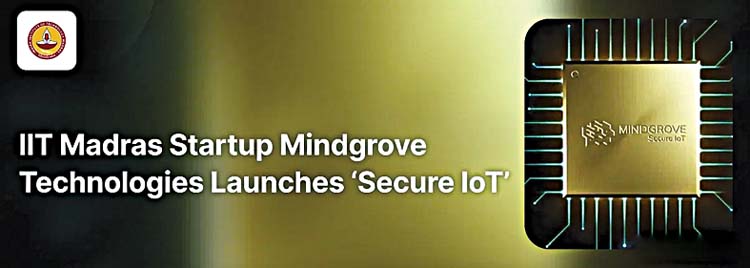Chennai, May 8 (Agency) The IIT-Madras faculty, students and researchers on Wednesday celebrated the successful design, manufacturing and bootup of India’s first commercial RISC V-based secure IoT system on chip by Mindgrove Start-up. The event was held at the IIT-Madras campus to promote a culture of innovation and entrepreneurship among students. The Institute also commenced a series called ‘Triumph Talks’ focused on the ‘IITM Start-up 100 Mission’ and also to mark this success, today. As on date, IIT Madras Incubation Cell has incubated 351 start-ups, which have attracted a total investment of Rs. 10,425 crore from Angel Investors and VC and have a combined valuation of Rs. 45,000 Crore. The start-ups generated Rs. 3,600 crore in revenue during 2022-23 Financial year, created more than 10,000 jobs and filed 210+ patents.
Prof. V. Kamakoti, Director, IIT Madras, outlined at the beginning of 2024 the vision of the Institute to incubate at least 100 start-ups in the calendar year. “To conceive of a start-up idea, and then forming a company and manufacturing a chip and finally booting it up, sitting in India, is a very complex task and I take this opportunity to congratulate Mr. Sharan Srinivas J., a PhD Student at IIT Madras, and Mr. Shashwath TR, CEO and Co-Founder of Mindgrove Technologies, and the entire team, comprising students from IIT Madras and other institutions, for bringing this great success, especially when India is gearing up in the area of Semiconductors. India is getting multiple semiconductor fabs and assembly units”, he said. Prof. Kamakoti saod “I am sure there will be a lot of customers who will use this clip. I take this opportunity to request all the big Indian industries and Automobile manufacturers such as Tata Group of Companies, Mahindra & Mahindra Automobile manufacturer, and infrastructure building companies like L&T to have a serious look at this chip and start using it in their installations. This is how we can build an Aatmanirbhar Bharat.” “From the side of SHAKTI, which was India’s first indigenously-developed microprocessor that came from IIT Madras, we have successfully taped out three commercial test designs, which have a lot of market potential.
Today, with the growth of IoT, Smart Cities, Smart Agriculture, and related fields. It is also important that a computing device which is part of this entire ecosystem is secure as electronics is coming close to humans. In this context, this particular chip will play a crucial role in building up a secure, digital IoT Framework for our country”, he added. “I am very happy that the SHAKTI project has reached this stage where we are in a position to deliver a product commercially available for the market. I take this opportunity to thank the Ministry of Electronics and Information Technology, the Ministry of Education, Department of Science and Technology, which provided the seed money for this project under the National Mission on Interdisciplinary Cyber-Physical Systems (NM-ICPS) and IIT Madras Alumnus Mr. Prathap Subramanian. IIT Madras Pravartak has played a crucial role in getting this start-up up and running and also helping them out with the designs. The Veena and Pratap Subrahmanyam Centre for Digital Intelligence, Security Hardware and Architecture (V&PS – CDISHA) has been the home for the SHAKTI project.
I am sure this is a well-taken first step in the design of a complete Aatmanirbhar Digital India”, Prof Kamakoti said. Mindgrove Technologies had launched India’s first commercial high-performance SoC (System on Chip) named ‘Secure IoT’. The RISC-V-based chip will allow Indian Original Equipment Manufacturers (OEMs) to use an Indian SoC in their products and help reduce the cost of their feature-rich devices, without compromising on high-end features. The chip is estimated to cost 30 per cent less than other chips in the similar segment This secure IoT Chip developed by Mindgrove can be used in multiple domains from wearables like smartwatches to smart city devices like connected electricity, water, and gas meters to connected home devices like smart locks, fans and speakers as well as EV Battery Management systems and control systems, among many others.

